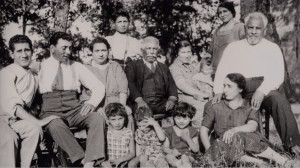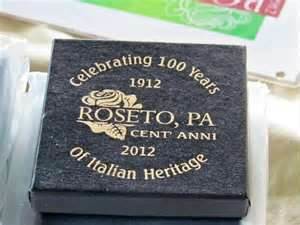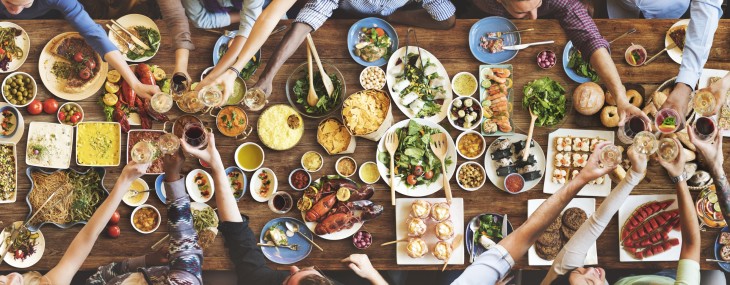 The men smoked unfiltered cigars and guzzled wine instead of sodas. They ate meatballs and sausages fried in lard with hard and soft cheeses.
The men smoked unfiltered cigars and guzzled wine instead of sodas. They ate meatballs and sausages fried in lard with hard and soft cheeses.
No concept of the Mediterranean Diet here.
They ranged in age from 55-64. Many of them toiled in slate quarries where illness from exposure to gases and dust was expected.
But not these guys. For them, heart disease was nearly non-existent. They remained happy and healthy, though statistically considered a high-risk group.
 It was 1961. What was going on in this little town of Roseto Pennsylvania? Crime was rare. Applications for public assistance were few and far between.[i]
It was 1961. What was going on in this little town of Roseto Pennsylvania? Crime was rare. Applications for public assistance were few and far between.[i]
What was the secret to their security, health, and longevity?
Scientists call it The Roseto Effect.
 Basically the town was a close-knit Italian community of immigrants. In their culture, family was everything. The strength of their social structure through extended relatives and friends created an atmosphere of security. If you lost your job, your neighbor had a cow and shared his milk with your children. You could work in his garden and easily find odd jobs. They had each other’s backs.
Basically the town was a close-knit Italian community of immigrants. In their culture, family was everything. The strength of their social structure through extended relatives and friends created an atmosphere of security. If you lost your job, your neighbor had a cow and shared his milk with your children. You could work in his garden and easily find odd jobs. They had each other’s backs.
 Researchers attributed their lack of heart disease to lower stress. Dr. Stewart Wolf, then head of Medicine at the University of Oklahoma, said, “The community was very cohesive. There was no keeping up with the Joneses. Houses were very close together, and everyone lived more or less alike.” Old people were valued and a big part of community life. Housewives were respected, and fathers led their families.[ii]
Researchers attributed their lack of heart disease to lower stress. Dr. Stewart Wolf, then head of Medicine at the University of Oklahoma, said, “The community was very cohesive. There was no keeping up with the Joneses. Houses were very close together, and everyone lived more or less alike.” Old people were valued and a big part of community life. Housewives were respected, and fathers led their families.[ii]
In, The Power of Clan, Dr. Wolf and co-author, John Bruhn, wrote about Roseto, studying the community from 1935-1984. Their conclusions agreed with other research.
“The magic of Roseto was the total avoidance of isolated individuals crushed by problems of everyday life. Rosetans avoided the internalization of stress. Stability and predictability was life soothing, hence life lengthening.”[iii]
The Rosetans’ health and well-being serves a vivid reminder of how brutal modern life can be and the heavy toll that stress puts on even the healthiest of us. Sadly, as the people of Roseto assimilated to American ways, heart disease rose.
Still, doesn’t this stand out as a picture of God’s kingdom? As His people, we may not have blood ties, but we are united by the blood of Jesus. We are branches of the same vine. The Bible speaks of the church as an organic living entity—not as an organization built by the traditions of men.
 Are there examples of the Roseto Effect in God’s people today? With healthcare costs rising, the formation of Christian medical sharing groups is an interesting trend. Instead of providing insurance, members take turns covering each other’s medical bills and some groups actually pray for the sick. The administrative costs are minimal. In effect, people help other people by sharing resources as a “community.”
Are there examples of the Roseto Effect in God’s people today? With healthcare costs rising, the formation of Christian medical sharing groups is an interesting trend. Instead of providing insurance, members take turns covering each other’s medical bills and some groups actually pray for the sick. The administrative costs are minimal. In effect, people help other people by sharing resources as a “community.”
Perhaps the Roseto Effect is most evident within small groups. In my small group experience, we pass an offering basket when someone has financial needs. We cook dinners for each other when someone is ill, injured, or grieving. We share garden produce and buy each other’s handiwork. We’ve learned to listen and encourage honesty, authenticity, and confidentiality. No one’s alarmed when anger and hurt arise. We have no problem saying sorry and forgiving. The group offers comfort, prayer, and hope. Though we agree with God’s moral standards, there’s no whiff of judgment if one has a son in trouble with the law, or an unmarried daughter with a baby, or an alcoholic spouse. And interestingly, we do not all attend the same denomination. To me this is the church being a family in a Roseto kind of way.
 Our heart disease stats may not be remarkable, and we can’t entirely avoid the stress of modern times. Yet, I believe God wants His people to be a family. And many families together form community.
Our heart disease stats may not be remarkable, and we can’t entirely avoid the stress of modern times. Yet, I believe God wants His people to be a family. And many families together form community.
 And if that community cultivates Kingdom Culture, it will bring unprecedented unity across generations, cultures, nationalities, and races to serve as a light on many hills in this critical time of human history.
And if that community cultivates Kingdom Culture, it will bring unprecedented unity across generations, cultures, nationalities, and races to serve as a light on many hills in this critical time of human history.
I can feel God’s pleasure in that – can you? Do you have a Roseto-like story in your world?
_____________________________
[i] Positano, Rock (November 23, 2007). “The Mystery of the Rosetan People”. Huffington Post. Retrieved January 18, 2014.
[ii] Bowden, Johnny; Sinatra, Stephen (2012). The Great Cholesterol Myth. Fair Winds Press. p. 240.
[iii] Positano, Rock (November 23, 2007). “The Mystery of the Rosetan People”. Huffington Post. Retrieved January 18, 2014.








